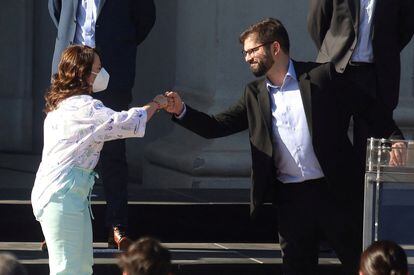The elected president of Chile, Gabriel Boric, greets his Mining Minister, Marcela Hernando, this Friday in Santiago.STRINGER (REUTERS)
The appointment of the Cabinet with more prior unknowns since Chile recovered democracy contained, however, some certainties.
The answer to the question of whether the formation of the Executive that would accompany Gabriel Boric would respond either to the refounding spirit of the first round of the campaign or to the message of moderation and centrism of the second, did not alter the certainty that, in any In this case, gender parity, understood as the balanced participation and representation of women and men in positions of power and decision-making, would be an essential criterion that many would like to see as a new political cycle.
The country needs it.
Chile has been impacted by a social outbreak in October 2019 that came to remove the foundations of their coexistence.
To this, the covid-19 pandemic must have been added, with consequences in an electoral marathon that brought Chileans to the polls six times between November 2020 and December 2022. At the same time, a constitutional drafting process is taking place from which a new fundamental letter must emanate that will be sanctioned in an exit plebiscite in the middle of the current year.
More information
More women and an average of 49 years: this is the new Government of Chile
achieving that the feminist perspective has the possibility of crossing the entire government management as Antonia Orellana, who will be its head, has pointed out.
This contributes to setting a new standard in terms of Mechanisms for the Advancement of Women in Latin America.
Until now, the highest level assigned was the institutional rank of ministry or when the incumbent's rank is that of minister with full participation in the Cabinet.
However, she gains greater importance by integrating the Political Committee because, with it, she debuts in the major leagues.
This supposes the transition, from a sectoral ministry, to become part of the space made up of the ministries occupied by the presidential "iron circle" (Interior, Treasury,
The recovery of parity in the executive, of which Michelle Bachelet was the forerunner in Latin America in 2006, but in which she did not persevere despite the fact that she came to occupy a second term after occupying the executive direction of UN Women, is more than a condition of necessity for the elected president. Boric achieved 68% of the votes of women under 30 years of age, also mobilizing the segment of women between 30 and 50 years of age. It also supposes an attempt to harmonize the composition of the executive power with that of the constitutional convention which, made up of 77 women and 78 men, has established a global reference standard in terms of constitutional development.
Although Chile shows the overcoming of a barrier by having not once, but twice a woman in the presidency, the path towards gender parity in power has not only not been linear, but has followed a path rather eccentric. Today we see how an executive and a joint constitutional convention are out of tune with other levels of political representation that should not be oblivious to the accelerating effect that Boric's decision produces. Such is the case of the Legislative Power. Thanks to Law 20,840, which modified the electoral system in 2015, it is established that until the 2029 elections, parties must have a maximum representation of each sex of 60%, which in practice, according to a recent study by Comunidad Mujer,"It works as a female quota of 40% of the total number of candidacies of each political conglomerate at the national level." In this way, the second elections held under its application in 2021 have allowed female participation in Congress to rise to 35.5%, 12.9% more than that obtained in the 2017 elections. For its part, the presence of senators hardly increased, going from 23.5% to 24%. From this perspective, Chile should consider that the regional trend is passing through the transition towards parity legislation that seven Latin American countries have today and that requires that the lists of candidates be made up of 50% women and men.9% more than that obtained in the 2017 elections. For its part, the presence of female senators barely increased, going from 23.5% to 24%. From this perspective, Chile should consider that the regional trend is passing through the transition towards parity legislation that seven Latin American countries have today and that requires that the lists of candidates be made up of 50% women and men.9% more than that obtained in the 2017 elections. For its part, the presence of female senators barely increased, going from 23.5% to 24%. From this perspective, Chile should consider that the regional trend is passing through the transition towards parity legislation that seven Latin American countries have today and that requires that the lists of candidates be made up of 50% women and men.
On the other hand, at the level of municipal power, and although the last elections saw a significant advance in the presence of women, with 17% of female mayors and 33% of female councilors without mediating a quota law, a bill is currently in the legislative process that seeks to establish them in the elections of regional governors, mayors and councilors.
Another trend that has not yet landed in Chile is the specific elaboration of legislation to prevent, address and punish political violence against women based on gender, which already exists in Bolivia, Mexico, Ecuador and Panama. The phenomenon has been collected by studies, both by the Humanas-Interpreta Corporation and by the Observatory of political violence "Women and Politics" of the University of Santiago (USACH), showing that "more than 70% of women who make up the constituent body have received violent or hateful messages.” The situation is ratified by the parliamentarians in a survey carried out by the Women's Observatory against Disinformation and Fake News in electoral processes, of the Multitudes Foundation.
Although the true test of a feminist government is the result of its policies, Chile will have, with the one inaugurated by Gabriel Boric, the executive with the most women to date, a composition that is accompanied by the will to promote regulations with a clearly feminist perspective. In this last aspect, you will have to be particularly strategic if you want to preserve the unprecedented female support base you have. Since it would be the intention of your Government to carry out the modification of the gender identity law with the aim of recognizing diverse identities, it is interesting to observe the transit of similar initiatives in other countries and that it has led to opening fissures within feminism. Look at the recent creation in Spain of the Feministas al Congreso (FAC) party,that was born as a reaction to the processing of what is known as the "Trans Law" by the coalition made up of the PSOE and Podemos, could serve as a mirror.
María de los Angeles Fernández Ramil
is a doctor in Political Science and president of the Hay Mujeres Foundation
Subscribe here to the EL PAÍS América
newsletter
and receive all the key information on current affairs in the region
Sign in to continue reading
Just by having an account you can read this article, it's free
RegisterLogin
Thanks for reading THE COUNTRY









/cloudfront-eu-central-1.images.arcpublishing.com/prisa/4PKPLHZOXBG5TEAQ6JNDTUJXBA.jpg)